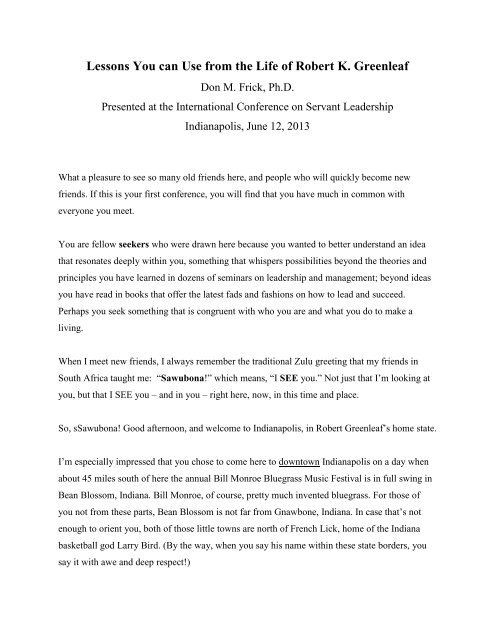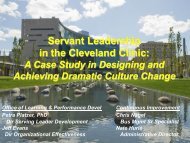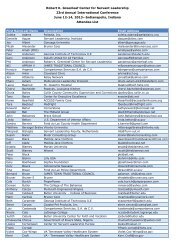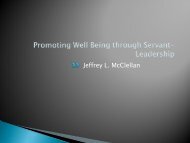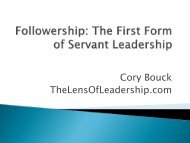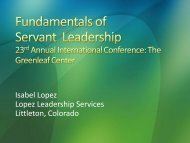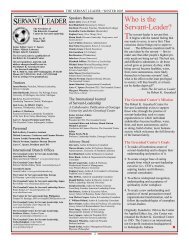Lessons You can Use from the Life of Robert K. Greenleaf
Lessons You can Use from the Life of Robert K. Greenleaf
Lessons You can Use from the Life of Robert K. Greenleaf
Create successful ePaper yourself
Turn your PDF publications into a flip-book with our unique Google optimized e-Paper software.
<strong>Lessons</strong> <strong>You</strong> <strong>can</strong> <strong>Use</strong> <strong>from</strong> <strong>the</strong> <strong>Life</strong> <strong>of</strong> <strong>Robert</strong> K. <strong>Greenleaf</strong><br />
Don M. Frick, Ph.D.<br />
Presented at <strong>the</strong> International Conference on Servant Leadership<br />
Indianapolis, June 12, 2013<br />
What a pleasure to see so many old friends here, and people who will quickly become new<br />
friends. If this is your first conference, you will find that you have much in common with<br />
everyone you meet.<br />
<strong>You</strong> are fellow seekers who were drawn here because you wanted to better understand an idea<br />
that resonates deeply within you, something that whispers possibilities beyond <strong>the</strong> <strong>the</strong>ories and<br />
principles you have learned in dozens <strong>of</strong> seminars on leadership and management; beyond ideas<br />
you have read in books that <strong>of</strong>fer <strong>the</strong> latest fads and fashions on how to lead and succeed.<br />
Perhaps you seek something that is congruent with who you are and what you do to make a<br />
living.<br />
When I meet new friends, I always remember <strong>the</strong> traditional Zulu greeting that my friends in<br />
South Africa taught me: “Sawubona!” which means, “I SEE you.” Not just that I’m looking at<br />
you, but that I SEE you – and in you – right here, now, in this time and place.<br />
So, sSawubona! Good afternoon, and welcome to Indianapolis, in <strong>Robert</strong> <strong>Greenleaf</strong>’s home state.<br />
I’m especially impressed that you chose to come here to downtown Indianapolis on a day when<br />
about 45 miles south <strong>of</strong> here <strong>the</strong> annual Bill Monroe Bluegrass Music Festival is in full swing in<br />
Bean Blossom, Indiana. Bill Monroe, <strong>of</strong> course, pretty much invented bluegrass. For those <strong>of</strong><br />
you not <strong>from</strong> <strong>the</strong>se parts, Bean Blossom is not far <strong>from</strong> Gnawbone, Indiana. In case that’s not<br />
enough to orient you, both <strong>of</strong> those little towns are north <strong>of</strong> French Lick, home <strong>of</strong> <strong>the</strong> Indiana<br />
basketball god Larry Bird. (By <strong>the</strong> way, when you say his name within <strong>the</strong>se state borders, you<br />
say it with awe and deep respect!)
2<br />
Before we jump into <strong>the</strong> fascinating and complicated life <strong>of</strong> <strong>Robert</strong> <strong>Greenleaf</strong>, I’d like to tell you<br />
a quick story about Larry Bird because it illustrates a key idea about servant-leaders. Besides,<br />
this is, after all, Indiana.<br />
After his Hall-<strong>of</strong>-Fame playing days, Larry ended up as coach <strong>of</strong> <strong>the</strong> Indiana Pacers on a 3-year<br />
contract. His first year as coach during <strong>the</strong> 1997-98 season, <strong>the</strong> team went to <strong>the</strong> conference<br />
semifinals and just missed making <strong>the</strong> championship series because a guy named Michael Jordan<br />
jumped higher than <strong>the</strong> moon and shot <strong>the</strong> basketball clean and true and with breathtaking grace.<br />
A week or so after <strong>the</strong> Pacers lost that series, a reporter asked Bird what changes he was<br />
planning to make to <strong>the</strong> team next year. Larry said, “Well, I don’t know if I’ll be <strong>the</strong> coach next<br />
year.”<br />
“What do you mean?” <strong>the</strong> reporter asked? “<strong>You</strong> have a 3 year contract.”<br />
“Oh, that doesn’t mean anything,” said Larry. “I haven’t talked to <strong>the</strong> players about it yet.”<br />
The reporter was puzzled. “What do <strong>the</strong>y have to say about it?” he asked.<br />
“Well,” said Larry, “unless <strong>the</strong>y want me back as <strong>the</strong>ir coach, I <strong>can</strong>’t be a real leader for <strong>the</strong>m,<br />
<strong>can</strong> I?”<br />
This was a new idea, so <strong>the</strong> reporter tracked down Reggie Miller and several o<strong>the</strong>r players on <strong>the</strong><br />
team and told <strong>the</strong>m what Larry had said. “Are you kidding?” said Reggie. “We’d be nuts not to<br />
want him back. Yeah, he’s tough, but he’s a player’s coach, a coach’s coach. We’d follow him<br />
into hell!”<br />
Larry Bird had figured out that even a pr<strong>of</strong>essional sports coach was not just a manager who<br />
could draw up plays or a person with a title; he or she was a LEADER. And an au<strong>the</strong>ntic leader
3<br />
is given moral authority by <strong>the</strong> followers, after earning trust by demonstrating that <strong>the</strong> leader was<br />
<strong>the</strong>re to serve individuals on <strong>the</strong> team as well as <strong>the</strong> overall vision <strong>of</strong> <strong>the</strong> team’s excellence.<br />
So, how would things be different in YOUR organization if that was <strong>the</strong> prevailing attitude <strong>of</strong><br />
designated leaders?<br />
I was sitting here remembering <strong>the</strong> first national servant leadership conference held in Atlanta in<br />
1988. After my friend and mentor Ann McGee-Cooper told me about it, I dragged myself down<br />
<strong>the</strong>re a few days after getting a cast removed for a broken leg. Boy, am I glad I went! Around<br />
100 people attended. Most <strong>of</strong> <strong>the</strong>m knew Bob <strong>Greenleaf</strong> personally, and I met amazing souls<br />
who quickly became personal heroes. <strong>Greenleaf</strong> attended by speakerphone <strong>from</strong> his home in<br />
Pennsylvania. But he had pre-recorded a video greeting to attendees, and I think it is as relevant<br />
today as it was 25 years ago, so here it is…<br />
[Play <strong>Greenleaf</strong>’s 1988 Conference Greeting]<br />
Bob continued to be gracious and sharp as a tack as people later asked him questions by<br />
speakerphone. <strong>You</strong> know, that Conference changed my life, and this one <strong>can</strong> change your life<br />
too.<br />
In <strong>the</strong> next few minutes I’ll be sharing some lessons you <strong>can</strong> use <strong>from</strong> <strong>the</strong> life <strong>of</strong> <strong>Robert</strong><br />
<strong>Greenleaf</strong> , and whe<strong>the</strong>r this is your first servant leadership conference or you’re an old hand like<br />
me – with <strong>the</strong> emphasis on OLD – who’s been to almost every conference, <strong>the</strong>y are ideas you<br />
<strong>can</strong> use in <strong>the</strong> next 2 ½ days. First, it’s fair to ask <strong>the</strong> question, “Why should we care?”<br />
Why Care About <strong>Robert</strong> <strong>Greenleaf</strong>?<br />
Well, why should we care about this guy <strong>Robert</strong> <strong>Greenleaf</strong> anyway? After all, his IDEAS were<br />
<strong>the</strong> important thing.
4<br />
What’s interesting is that Bob would have agreed with that. Even though he made a number <strong>of</strong><br />
notes about his life experiences in his last 10 years, he did not really want a <strong>Robert</strong> <strong>Greenleaf</strong><br />
biography. He wanted a book titled “The Autobiography <strong>of</strong> an Idea” that traced <strong>the</strong> sources and<br />
applications <strong>of</strong> <strong>the</strong> servant-leader idea. It wasn’t that he had anything to hide in his own life. But<br />
he was a natural introvert; he was genuinely humble and never wanted <strong>the</strong> focus to be on him.<br />
He was also a pragmatist, and for him <strong>the</strong> point was whe<strong>the</strong>r <strong>the</strong>se ideas made a difference in <strong>the</strong><br />
lives <strong>of</strong> individuals and organizations.<br />
First, though, people need to understand <strong>Greenleaf</strong>’s ideas, and here’s <strong>the</strong> problem with that.<br />
The terms “servant-leader” and “servant-leadership” are catchy phrases, partly because <strong>the</strong>y<br />
represent paradoxes. It’s easy to hear <strong>the</strong>m and think you know what <strong>the</strong>y mean because <strong>the</strong>y<br />
create a blank slate ripe for projections. Maybe you’ve heard some <strong>of</strong> <strong>the</strong>se projections…<br />
“Servant leadership is only a religious phrase and may even be part <strong>of</strong> some kind <strong>of</strong> spooky<br />
sect.”<br />
“The word ‘servant’ means it’s about being a martyr, or being servile. It has bad references to <strong>the</strong><br />
history <strong>of</strong> slavery in this country.”<br />
“Servant leadership just ano<strong>the</strong>r paternalistic idea hatched up by men to keep women in <strong>the</strong>ir<br />
place.”<br />
Then, when you hear <strong>the</strong> core capacities associated with servant leadership, you think you know<br />
what <strong>the</strong>y mean too.<br />
Listening is about active listening, which you <strong>can</strong> learn <strong>from</strong> multiple sites on <strong>the</strong> Internet.<br />
Foresight is just ano<strong>the</strong>r way <strong>of</strong> saying you should read <strong>the</strong> latest books by futurists.
5<br />
Reflection simply means you logically analyze an idea.<br />
Ethical use <strong>of</strong> power is about staying legal while you persuade someone to adopt your point <strong>of</strong><br />
view.<br />
But if you actually READ <strong>Greenleaf</strong>, you realize that he had a different take on all <strong>of</strong> <strong>the</strong>se skills<br />
and capacities. For example, Listening – for a servant-leader – means that you are present to<br />
<strong>the</strong> speaker’s words and inflections and body signals and, even more importantly, that you are<br />
open to being transformed by what you hear, not just that you are thinking about what to say<br />
next.<br />
If you don’t read what <strong>Greenleaf</strong> actually wrote, you may think that your quick assumptions<br />
about what he means are just a repackaging <strong>of</strong> tired old truisms. <strong>You</strong> will be looking at your own<br />
projections on that blank slate and not gaining <strong>the</strong> richness and fresh thinking <strong>of</strong> an Ameri<strong>can</strong><br />
original.<br />
If you are new to servant leadership, I urge you to attend one <strong>of</strong> <strong>the</strong> sessions that cover <strong>the</strong> basics<br />
<strong>of</strong> servant leadership, taught by Isabel Lopez or Jeff Miller and Shirley Rivera, and o<strong>the</strong>rs. And,<br />
whatever you do, dive into his essays for yourself. Some are denser than o<strong>the</strong>rs, but Bob always<br />
had his reasons for constructing <strong>the</strong>m carefully so <strong>the</strong>y could crack open <strong>the</strong> reader’s mental<br />
models and lead to<br />
<strong>Lessons</strong> <strong>You</strong> Can <strong>Use</strong>…<br />
As you enjoy <strong>the</strong> conference in <strong>the</strong> next three days, keep in mind some <strong>of</strong> <strong>the</strong> lessons <strong>from</strong><br />
<strong>Robert</strong> <strong>Greenleaf</strong>’s life. These are not just lessons <strong>from</strong> his writings – even though you’ll find<br />
those a’plenty – but <strong>from</strong> his life experiences and learnings.<br />
Nurture Friendships with Astonishing People
6<br />
First, Nurture Friendships with Astonishing People<br />
Yesterday I again read through some <strong>of</strong> <strong>Greenleaf</strong>’s correspondence and schedule books in <strong>the</strong><br />
archives and was still amazed at <strong>the</strong> range <strong>of</strong> people he kept in touch with. Here is a very short<br />
list:<br />
<br />
<br />
<br />
<br />
<br />
<br />
<br />
<br />
<br />
<br />
<br />
<br />
<br />
<br />
<br />
<br />
The Foreign Minister <strong>of</strong> India<br />
Derek Bok, President <strong>of</strong> Harvard University<br />
Norman Vincent Peale<br />
Authors ranging <strong>from</strong> Laurens Van der Post to Rabbi Abraham Joshua Heschel<br />
<strong>Robert</strong> Frost<br />
Jan and Olga Erstazek, founders <strong>of</strong> <strong>the</strong> Olga bra company<br />
The Menninger bro<strong>the</strong>rs<br />
Alfred Korzybski, <strong>the</strong> fa<strong>the</strong>r <strong>of</strong> modern General Semantics<br />
Eileen Garrett and Arthur Ford, <strong>the</strong> most famous psychics <strong>of</strong> <strong>the</strong>ir day<br />
Patch Adams M.D. – yes – <strong>the</strong> guy played by Robin Williams in <strong>the</strong> movie. Dr. Adams<br />
credits <strong>Greenleaf</strong> with giving him hope and encouragement when <strong>the</strong> medical community<br />
thought he was nuts.<br />
Marshall Gilula, M.D., neurologist, pioneer in bi<strong>of</strong>eedback, and first editor <strong>of</strong> <strong>the</strong> Journal<br />
<strong>of</strong> Holistic Medicine<br />
Peter and Doris Drucker<br />
Bill Wilson, co-founder <strong>of</strong> Alcoholics Anonymous<br />
Douglas McGregor, who proposed <strong>the</strong> Theory X and Theory Y explanations<br />
<strong>of</strong> human motivation in his classic management book The Human Side <strong>of</strong> Enterprise<br />
James McSwinney, CEO <strong>of</strong> <strong>the</strong> Mead Corporation, a friend who helped edit every one <strong>of</strong><br />
Bob’s early essays<br />
Hundreds <strong>of</strong> students and ministers and teachers and just plain seekers
7<br />
This is quite a list for a dyed-in-<strong>the</strong>-wool introvert, but it is safe to say that <strong>Greenleaf</strong> learned<br />
<strong>from</strong> every one <strong>of</strong> <strong>the</strong>se people, and judging by what <strong>the</strong>y say in <strong>the</strong>ir letters, <strong>the</strong>y also looked to<br />
him for wisdom.<br />
<strong>You</strong> are in luck this week because astonishing people are all around you at this conference –<br />
world-class authors, wise elders, razor-smart researchers, CEOs, pr<strong>of</strong>ound souls who are famous<br />
and not famous.<br />
Spirit Carriers<br />
At <strong>the</strong> top <strong>of</strong> <strong>the</strong> list <strong>of</strong> those you should seek out, <strong>Greenleaf</strong> would put those he called “spirit<br />
carriers.” Who are <strong>the</strong>y? Let me quote <strong>Greenleaf</strong>:<br />
“In my view <strong>of</strong> <strong>the</strong> world <strong>the</strong>re are people whom I would call “spirit carriers.” Servants<br />
who nurture <strong>the</strong> human spirit are spirit carriers. They serve to connect those who do <strong>the</strong><br />
work <strong>of</strong> <strong>the</strong> world, or who are being prepared for that role, with vision <strong>from</strong> both past and<br />
contemporary prophets. Those servants find <strong>the</strong> resources and make <strong>the</strong> intensive effort<br />
to be an effective influence. They don’t just make speeches or write books as <strong>the</strong> prophet<br />
does. They are spirit carriers; <strong>the</strong>y connect <strong>the</strong> prophecy with <strong>the</strong> people so that it<br />
changes <strong>the</strong>ir lives. The spirit is power, but only when <strong>the</strong> spirit carrier, <strong>the</strong> servant as<br />
nurturer <strong>of</strong> <strong>the</strong> human spirit, is a powerful and not a casual force.”<br />
This room is packed with spirit carriers. Find <strong>the</strong>m. Better yet, become one yourself.<br />
Be Alert to “Openings”<br />
The word “openings” was used by Quaker founder George Fox to describe insights that <strong>can</strong><br />
enlarge our understandings, or even be transformative.
8<br />
Insights are usually shy. They <strong>can</strong> flit through <strong>the</strong> mind and <strong>the</strong>n disappear like <strong>the</strong> vapor <strong>of</strong> a<br />
dream you begin to forget when you first wake up. Be mindful, be open to <strong>the</strong>se openings<br />
because I guarantee, many <strong>of</strong> <strong>the</strong>m will visit you in <strong>the</strong> next three days.<br />
<strong>Robert</strong> <strong>Greenleaf</strong> had an opening one day when a wasp landed on his hand. He had never got<br />
along with stinging insects. He had kept a bee hive during World War II and was regularly stung<br />
by <strong>the</strong> rascals. But on this day, he didn’t brush away <strong>the</strong> wasp. He felt it was curious about him,<br />
and he became curious about it. From <strong>the</strong>n on, he enjoyed his encounters with stinging insects<br />
and was never stung again.<br />
Now, that may not seem like a pr<strong>of</strong>ound insight, but Bob did describe it as an “opening” that<br />
enlarged him in some way, even if he didn’t fully understand it.<br />
<strong>Greenleaf</strong> considered his dreams as sources <strong>of</strong> “openings.” He wrote <strong>the</strong>m down and did two<br />
years <strong>of</strong> Jungian dream <strong>the</strong>rapy work to help him understand <strong>the</strong>m. As you become mindful <strong>of</strong><br />
openings this week, consider <strong>the</strong>se short accounts <strong>of</strong> two <strong>of</strong> his dreams…<br />
<strong>Greenleaf</strong> took <strong>the</strong> train to work one morning and immediately entered that hypnogogic state that<br />
is halfway between wakefulness and sleep. He immediately entered into a light dream, and in <strong>the</strong><br />
dream a friend who had died two years earlier stopped and had a conversation with him. Some <strong>of</strong><br />
<strong>the</strong> conversation was about practical matters at work, but most <strong>of</strong> it was about Bob’s spiritual<br />
development. Along <strong>the</strong> way, Bob’s friend said that we shouldn’t be concerned with ideas about<br />
– or <strong>from</strong> – <strong>the</strong> unconscious. We should accept that <strong>the</strong>re is a mysterious realm that serves us, but<br />
we’ll never have full comprehension <strong>of</strong> it.<br />
When <strong>the</strong> train reached its destination 30 minutes later, Bob woke <strong>from</strong> his reverie and noticed<br />
that, in his words, “The world was brighter and more sprightly and attractive than usual. My step<br />
was light and I was in a state <strong>of</strong> euphoria.” He reported that some <strong>of</strong> <strong>the</strong> altered state dropped<br />
away as he became engaged in routine matters, but he retained some <strong>of</strong> <strong>the</strong> glow all day, maybe<br />
because he had been assured that <strong>the</strong>se little openings as natural and trustworthy sources <strong>of</strong><br />
wisdom.
9<br />
Here’s a report <strong>of</strong> ano<strong>the</strong>r dream…<br />
“We are having a large party at our house and I am standing with a group <strong>of</strong> people on <strong>the</strong> lawn.<br />
I am making a speech about how our experience stands in <strong>the</strong> way <strong>of</strong> our perception.”<br />
A short but pr<strong>of</strong>ound opening, as relevant today as it was in 1958. Pay attention to it; don’t let<br />
your experience stand in <strong>the</strong> way <strong>of</strong> your perception at this conference. In fact, at this conference<br />
you are likely to have openings that come in <strong>the</strong> form <strong>of</strong> new questions, ra<strong>the</strong>r than answers to<br />
old ones. And, by <strong>the</strong> way, if you have any dreams in <strong>the</strong> next few days, write <strong>the</strong>m down. Share<br />
<strong>the</strong>m. Sit quietly and let <strong>the</strong>m speak to you because <strong>the</strong>y are usually coded messages <strong>of</strong><br />
something that is important for your development.<br />
Research is Necessary but not Sufficient<br />
It is safe to say that more remarkable research about <strong>the</strong> efficacy <strong>of</strong> servant leadership will be<br />
presented at this conference than has ever been shared anywhere, at any time. <strong>Greenleaf</strong> would<br />
have been amazed, because he oversaw scores <strong>of</strong> research studies at AT&T, as well as during his<br />
consulting days, and <strong>the</strong> findings were used to inform policies that affected thousands – even<br />
millions <strong>of</strong> people.<br />
The man was a world-class researcher. He had been a math major and knew how to generate,<br />
interpret and validate quantitative data. But he was also adept at qualitative research. In fact, he<br />
<strong>the</strong> U.S. government gave him a secret clearance during WWII, which he used in part to help to<br />
conduct and interpret social science research about issues on <strong>the</strong> home front.<br />
But research alone was never enough for him. Time and again he saw his findings partially or<br />
totally ignored by decision makers because <strong>the</strong>y were inconvenient or went against – quote,<br />
unquote – “common knowledge.” I’m sure that’s never happened to you! He learned that
10<br />
research didn’t matter if it was ignored, or if it wasn’t backed up by people with <strong>the</strong> courage to<br />
live <strong>the</strong> results in <strong>the</strong>ir lives and organizations.<br />
I well remember a trip I took 40 years ago to a national art educator’s conference. Ann McGee-<br />
Cooper was in charge <strong>of</strong> <strong>the</strong> program that year and she invited me to accompany her and some <strong>of</strong><br />
her students on <strong>the</strong> adventure. There was a clear left-brain, right-brain split in that crowd – <strong>the</strong><br />
left-brain academic researchers versus <strong>the</strong> wild and crazy-creative right brain artists.<br />
Well, <strong>the</strong>re is a place for people who simply love to do research, and for those who simply love<br />
to create and couldn’t care less about quantifying <strong>the</strong> results. But one <strong>of</strong> <strong>the</strong> things that Ann<br />
taught me on that trip was <strong>the</strong> importance <strong>of</strong> being WHOLE-BRAINED, to straddle <strong>the</strong><br />
paradoxes, to find freedom by giving yourself choices about how to respond to what’s happening<br />
around you instead <strong>of</strong> always being “on automatic.”<br />
One <strong>of</strong> <strong>the</strong> wonderful things about <strong>the</strong> cutting-edge researchers we’ll be learning <strong>from</strong> this week<br />
is that <strong>the</strong>y tend to be practitioners first, people who are also living <strong>the</strong> ideals <strong>of</strong> servant<br />
leadership. <strong>You</strong> will view <strong>the</strong> research in that context, but when you take it back to your<br />
workplace, it will be easy for a few bosses to learn that servant-led companies tend to average a<br />
30% to 50% higher pr<strong>of</strong>it margins and say, “Boy, that’s for me! Tell me, what do I do to get<br />
those numbers?!” But, <strong>of</strong> course, that is <strong>the</strong> wrong question. The right question is, “What are<br />
some new questions and concrete steps I <strong>can</strong> take to help me personally and this organization<br />
develop a new vision <strong>of</strong> who and what we <strong>can</strong> BE?” Because, THAT is what is sufficient to<br />
complete <strong>the</strong> research that is necessary.<br />
Be Faithful<br />
Like Abraham Lincoln, <strong>Robert</strong> <strong>Greenleaf</strong> had a peculiar ambition. Lincoln wanted to earn <strong>the</strong><br />
esteem <strong>of</strong> his fellow citizens, and being President was just one way <strong>of</strong> doing that. He thought that<br />
<strong>the</strong> memory <strong>of</strong> his actions was his only shot at immortality, ra<strong>the</strong>r than <strong>the</strong> more traditional route
11<br />
<strong>of</strong> embracing a particular religious doctrine that promises immortality if you just do <strong>the</strong> right<br />
thing.<br />
<strong>Robert</strong> <strong>Greenleaf</strong> ‘s ambition was to be faithful to his work, without needing to know whe<strong>the</strong>r it<br />
would make him famous or rich, or even if it would make its own way in <strong>the</strong> world.<br />
In 1960, <strong>Greenleaf</strong> was struggling to finish his first book manuscript about <strong>the</strong> concept <strong>of</strong><br />
Strength. In his journal, he documented a breakthrough. After viewing some rock formations that<br />
he thought were transcendently beautiful, he suddenly saw his work on <strong>the</strong> book as something<br />
enjoyable to do for its own sake. It was no longer drudgery, and his goal was not to simply see a<br />
book published with his name on it. He wrote:<br />
“I have no feeling that I need to live to finish this work. It is something I feel <strong>the</strong> urge to work<br />
on. Whatever it turns out to be is OK. If nothing emerges, that is OK too.”<br />
I thought I felt that way when I worked on <strong>the</strong> <strong>Greenleaf</strong> biography for seven years, but I was<br />
still disappointed when <strong>the</strong> world didn’t stop <strong>the</strong> day it was published and I received no<br />
congratulatory letter <strong>from</strong> <strong>the</strong> President <strong>of</strong> <strong>the</strong> United States. That’s when I realized that I had<br />
harbored some personal grandiosity all along. Even though <strong>the</strong> book was about <strong>Robert</strong> <strong>Greenleaf</strong><br />
and not me, I thought <strong>the</strong> universe had made a deal with me: If I did <strong>the</strong> work, <strong>the</strong> universe<br />
would automatically take care <strong>of</strong> all my needs. Wrong! The impact <strong>of</strong> <strong>the</strong> book would be exactly<br />
what I hoped for. Wrong! It would generate enough income to do a whole series <strong>of</strong> books on<br />
<strong>Greenleaf</strong> and servant leadership. Wrong again. That was my small self speaking, my own<br />
ambition that wasn’t nearly as selfless as I told myself it was.<br />
I was <strong>the</strong> victim <strong>of</strong> what is called in <strong>the</strong>ology, “Name it and claim it <strong>the</strong>ology.” It’s like an<br />
automatic slot machine. Put in <strong>the</strong> money and you’ll get your reward in multiples. I realize this is<br />
an attractive and common notion, and <strong>the</strong>re is enough truth in it that it bears considering.<br />
<strong>You</strong>r experience may be different, but I learned that <strong>the</strong> real deal was this: My job was to be<br />
faithful, period, and that effort <strong>of</strong>fered grace enough. I’m not powerful enough to control all
12<br />
outcomes. Sure, I had to be involved in marketing <strong>the</strong> book but I also learned that if people<br />
needed to read it, <strong>the</strong>y would find it.<br />
In her 2012 book So Far From Home, published by Berrett-Koehler, Margaret Wheatley talks<br />
about how important it is to give up <strong>the</strong> notion that you, personally, are going to change <strong>the</strong><br />
world. Maybe you will, but expecting it opens <strong>the</strong> door for a kind <strong>of</strong> grandiosity and<br />
disappointment that <strong>can</strong> lead to bitterness and burnout when <strong>the</strong> world doesn’t change, or<br />
changes too slowly for you to notice.<br />
She recommends we adopt <strong>the</strong> attitude <strong>of</strong> what she calls a “spiritual warrior,” and Dr. Wheatley<br />
describes what that means…<br />
“The term " warrior" is used <strong>from</strong> <strong>the</strong> Tibetan tradition <strong>of</strong> "one who is brave," brave enough to<br />
never use aggression, whose only "weapons" are compassion and insight.) As warriors for <strong>the</strong><br />
human spirit, we discover our right work, work that is ours to do no matter what. We engage<br />
wholeheartedly, embody values we cherish, let go <strong>of</strong> outcomes, and be vigilant with our<br />
relationships. We learn how to persevere, to remain focused and confident in service to <strong>the</strong> issues<br />
and people we care about, focused not so much on making a difference as on being a difference.”<br />
So, how about you? Are you ready to be faithful? To let go <strong>of</strong> outcomes? To be a spiritual<br />
warrior? If so, you <strong>can</strong> start today. At this conference.<br />
Enjoy <strong>the</strong> ride!<br />
When you look at <strong>the</strong> famous picture <strong>of</strong> <strong>Robert</strong> <strong>Greenleaf</strong>, in contemplation, you might think that<br />
he was a kindly Quaker saint who never had much fun in life. Not true! He was serious about <strong>the</strong><br />
work he was born to do, and about living into what he called his unique “legitimate greatness,”<br />
but believe me, he had a lot <strong>of</strong> fun along <strong>the</strong> way!
13<br />
Here is what his AT&T colleague Douglas Williams said about him….<br />
“He had an ever-present, chuckling sense <strong>of</strong> humor. He was one <strong>of</strong> <strong>the</strong> most enjoyable<br />
men to be with I have ever met. I keenly remember that talking with Bob in his <strong>of</strong>fice at<br />
195 Broadway was a stimulating, gratifying experience. He would pull out <strong>the</strong> lower<br />
drawer <strong>of</strong> his desk put a foot on it, lean back, put his hands behind his head and look at<br />
<strong>the</strong> ceiling. He was a person with whom you could engage in participatory thinking. I<br />
always felt <strong>the</strong> better after partnering with him.”<br />
I remember my first day at work at <strong>the</strong> <strong>Greenleaf</strong> Center back in 1992. The staff went out to<br />
lunch toge<strong>the</strong>r and I said, “Hey, does anyone know any servant leadership jokes?” One person<br />
said, only half-kidding, “Servant-leaders don’t tell jokes!”<br />
That wasn’t true about Bob <strong>Greenleaf</strong>, who loved to tell and hear jokes. Some <strong>of</strong> <strong>the</strong>m were a<br />
little bawdy, too, but he never told those in mixed company.<br />
Bob and Es<strong>the</strong>r enjoyed <strong>the</strong> ride and squeezed all <strong>the</strong> juice <strong>the</strong>y could out <strong>of</strong> <strong>the</strong>ir time toge<strong>the</strong>r.<br />
They climbed mountains. They camped out. They rode tandem bicycles and attended every<br />
classical concert, lecture, play and public reading <strong>the</strong>y could fit in while <strong>the</strong>y lived in Manhattan.<br />
In fact, that’s how Bob came to know <strong>Robert</strong> Frost.<br />
They were organic gardeners before it was cool. Es<strong>the</strong>r was especially interested in healthy food<br />
and looked up nutritionist Adelle Davis after she read her books, and <strong>the</strong>y became friends.<br />
Around <strong>the</strong> <strong>Greenleaf</strong> household, Es<strong>the</strong>r called chocolate by its proper name – “sin.”<br />
Soon after his marriage to Es<strong>the</strong>r, Bob received some advice <strong>from</strong> his fa<strong>the</strong>r. First, George urged<br />
Bob and Es<strong>the</strong>r to “stay sweet.” Second, like a good fa<strong>the</strong>r, he dispensed practical advice on<br />
health insurance that had a little humor involved.
14<br />
“The very best kind <strong>of</strong> insurance,” said George, “and <strong>the</strong> cheapest, is to take care <strong>of</strong> yourself.<br />
Watch your step, watch your health, don’t overwork and don’t worry. Also vote <strong>the</strong> Republi<strong>can</strong><br />
ticket – at least nationally.”<br />
By <strong>the</strong> way, <strong>the</strong> Republi<strong>can</strong> Herbert Hoover was running against Democrat Al Smith that year.<br />
While <strong>the</strong> Republi<strong>can</strong>s were identified with <strong>the</strong> booming economy, Smith was tainted by <strong>the</strong><br />
Tammany Hall s<strong>can</strong>dal, and lack <strong>of</strong> integrity in public <strong>of</strong>ficials did not sit well with George<br />
<strong>Greenleaf</strong>. Lest you think he was a political ideologue, George went on to say that he was voting<br />
Democratic in <strong>the</strong> state and local elections because “we need a housecleaning over here and <strong>the</strong><br />
Democrats put out a good ticket.”<br />
So, while you are listening to serious ideas this week, take time to enjoy <strong>the</strong> ride. Don’t<br />
overwork and don’t worry. Who knows; maybe you <strong>can</strong> create a servant leadership joke that<br />
starts with this line: “So <strong>Robert</strong> <strong>Greenleaf</strong> and a platybus walked into a bar…”<br />
Just a thought.<br />
Answer Tragedy with Beauty<br />
I dearly hope no personal tragedy befalls you this week, but all you need to do is open this<br />
morning’s paper to see evidence <strong>of</strong> it in every part <strong>of</strong> our round world. Sometimes it <strong>can</strong> simply<br />
get you down. Did you ever think <strong>of</strong> responding with beauty?<br />
In 1939 Es<strong>the</strong>r <strong>Greenleaf</strong> went to <strong>the</strong> hospital to give birth to a beautiful, healthy little girl named<br />
Anne. But Anne immediately caught one <strong>of</strong> <strong>the</strong> infections so common in hospitals those days.<br />
Had it happened 10 years later, penicillin would have cured it right away, but that miracle drug<br />
was not yet available.<br />
The doctor told Bob and Es<strong>the</strong>r that little Anne would only live a week and <strong>the</strong>re was nothing<br />
that ei<strong>the</strong>r medical science or her stricken parents could do to help.
15<br />
Bob brought a vase <strong>of</strong> flowers into <strong>the</strong> nursery and put it on <strong>the</strong> windowsill by <strong>the</strong> radiator. Then<br />
he wheeled his daughter over by <strong>the</strong> flowers where she could catch <strong>the</strong> heat <strong>of</strong> <strong>the</strong> radiator and<br />
<strong>the</strong> light <strong>of</strong> <strong>the</strong> sun and took one picture after ano<strong>the</strong>r, desperate to preserve on film as much <strong>of</strong><br />
this precious, waning life as possible.<br />
But <strong>the</strong> doctor was right. In this case even all <strong>the</strong> love in <strong>the</strong> world couldn’t save Anne.<br />
Just after she died, Bob’s fa<strong>the</strong>r George sent this note…<br />
Dear <strong>Robert</strong> and Es<strong>the</strong>r,<br />
I am deeply grieved on account <strong>of</strong> our loss and as usual under such circumstances am<br />
weighed down by a feeling <strong>of</strong> complete helplessness.<br />
The beginning and <strong>the</strong> end <strong>of</strong> life are beyond my power <strong>of</strong> comprehension; but I know<br />
that time is a great healer and that <strong>the</strong> here and now hold many compensations. Courage<br />
and hope still live and every night <strong>of</strong> storm and stress is followed by <strong>the</strong> dawn <strong>of</strong> a new<br />
day.<br />
Lovingly, Fa<strong>the</strong>r<br />
After receiving that letter, Bob finally went into <strong>the</strong> darkroom to develop his hospital pictures.<br />
Imagine how, as he watched each print slowly came up in <strong>the</strong> developer tray, in a darkroom<br />
illuminated by a red, eerie safe light, he realized that all he and Es<strong>the</strong>r had left <strong>of</strong> Anne were<br />
memories and <strong>the</strong>se images…<br />
They grieved mightily. As soon as <strong>the</strong>y could, <strong>the</strong>y both threw <strong>the</strong>mselves into <strong>the</strong> work at hand.<br />
Es<strong>the</strong>r took care <strong>of</strong> <strong>the</strong>ir son Newcomb and Bob went back to his job as one <strong>of</strong> <strong>the</strong> top people at<br />
<strong>the</strong> world’s largest corporation. But both <strong>of</strong> <strong>the</strong>m also wisely did <strong>the</strong>ir personal art.
16<br />
Es<strong>the</strong>r created her paintings, which were beginning to look like <strong>the</strong> abstract expressionist<br />
<strong>can</strong>vases that o<strong>the</strong>r famous artists would show in ano<strong>the</strong>r 15 years.<br />
Bob built a chair. He worked on his ceramic pieces. He played his recorder and sang baritone<br />
with a group <strong>of</strong> harmonizing friends, and he also wrote. He wrote this entry in his journal a few<br />
months after Anne’s death, which seems to say that <strong>the</strong> small, short drop <strong>of</strong> life that was Anne<br />
COUNTED, and it was beautiful….<br />
“Spend all you have for loveliness. Buy it and never count <strong>the</strong> cost for one white, surging<br />
hour <strong>of</strong> peace. Count many a year <strong>of</strong> strife well lost, and for a breath <strong>of</strong> ecstasy give all<br />
you have been or could be.”<br />
A few months later, after he had begun to reorient his life without <strong>the</strong> daughter he had held, he<br />
wrote this entry in his journal…<br />
“This day I saw an objective clearly. Always I have wondered about <strong>the</strong> verse, “Ask, and<br />
it shall be done unto you…seek and ye shall find.” It has not seemed reasonable that I<br />
should ask for wealth or power or great accomplishment. Today I resolved to make a rich<br />
life out <strong>of</strong> what was now in hand – my family, my home, my friends, my job, my present<br />
abilities and my present limitations. Ask for nothing that is not here and now – merely<br />
ask to make <strong>of</strong> <strong>the</strong>m a harmonious whole – to create attitudes and energies to control and<br />
utilize.”<br />
And what about you? Are you willing to trust <strong>the</strong> wisdom <strong>of</strong> beauty to answer tragedy? And,<br />
how could that principle make a difference in your workplace?<br />
Conserving Opportunity for <strong>the</strong> Human Spirit<br />
We don’t have enough time to delve into some <strong>of</strong> <strong>the</strong> o<strong>the</strong>r life lessons a study <strong>of</strong> <strong>Greenleaf</strong>’s life<br />
<strong>of</strong>fers. <strong>You</strong>’ll find most <strong>of</strong> <strong>the</strong>m scattered in his writings. Let me leave you with this final quote
17<br />
<strong>from</strong> a journal in 1942. No one except <strong>Greenleaf</strong> freaks like me has ever seen it before. As you<br />
hear it, please try to remember that it is NOT about politics, especially modern politics.<br />
“Conservatism is not <strong>the</strong> preservation <strong>of</strong> something old – even if it is still good or still has<br />
some validity. It is <strong>the</strong> cultivation <strong>of</strong> <strong>the</strong> opportunity for <strong>the</strong> human spirit to flower. This<br />
is never preserved – it must be won anew by each generation. Conservation in <strong>the</strong> natural<br />
world is maintaining <strong>the</strong> optimum conditions for growing things. It is not what is done in<br />
museums, which is useful, but secondary.<br />
Thank you.<br />
Don welcomes emails at: don@donfrick.com or phone calls at 317-474-2986.


